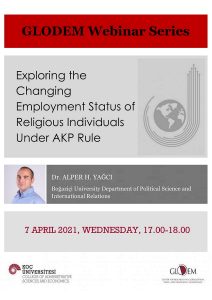Exploring the changing employment status of religious individuals under AKP rule
March 31, 2021Center for Research on Globalization, Peace and Democratic Governance (GLODEM) based at Koç University, pursues to engage with academic research on globalization, regionalization, peace, public administration and politics and governance. GLODEM Webinar Series, initiated to discuss and analyze selected current topics from an academic perspective with the experts of the issues, now continues its fourth session with the title of “Exploring the changing employment status of religious individuals under AKP rule”. The event will be moderated by Caner Bakır with the participation of Alper Yağcı on 7 April 2021, Wednesday at 17.00.
GLODEM invites you to the Webinar Series.
Date: 7 April 2021
Time: 17.00-18.00.
Speaker: Alper Yağcı, Boğaziçi University
Moderator: Caner Bakır, Koç University
Zoom registration link: (advance registration required)
https://kocun.zoom.us/webinar/register/WN_q6l8P727Tx-pdKlEo8OG8Q
Title: Exploring the changing employment status of religious individuals under AKP rule
Summary: In societies that are horizontally fragmented between identity-based social groups, electoral competition is often motivated by the desire to use public office to advance group interests. In a research with Cem Oyvat and Hasan Tekgüç, we focus on the case of Türkiye to study group favoritism in such a context. We investigate whether the religiously conservative Justice and Development Party’s (AKP) term in office has rewarded religious people. Rigorous individual-level empirical study of this question has so far remained limited since official household surveys in Türkiye do not include questions about religion and religiosity. We fill this gap by exploiting the Barometre series of KONDA, which surveys representative samples of Türkiye’s adult population monthly. We analyze whether age cohorts that joined the labor market before and after AKP came to power experience varying outcomes in employment depending on their religiosity. The preliminary findings are: under AKP rule, religious Sunni individuals experienced significant improvement in their ratio in public sector employment (especially women) and private higher-status jobs (only men). In fact, for the youngest cohorts, the previous high-status employment gap between religious Sunnis and the rest has already closed. While a significant literature already examines the economic determinants of voting behavior in Türkiye, our research contributes to the understudied question of how policy outcomes affect demographic groups with varying likelihood to vote for the incumbent party.
Bio: Alper Yağcı is an Assistant Professor at Boğaziçi University’s Political Science and International Relations department. He received his PhD from the University of Massachusetts Amherst in 2016 and also worked at Özyeğin University. His research has been published in Journal of European Public Policy, Party Politics, New Political Economy, Electoral Studies, Government and Opposition, Mediterranean Politics, Turkish Studies
The event will be held in English via Zoom.
Please visit the link below to register for the event.
https://kocun.zoom.us/webinar/register/WN_q6l8P727Tx-pdKlEo8OG8Q

